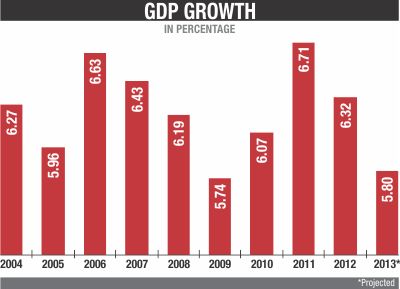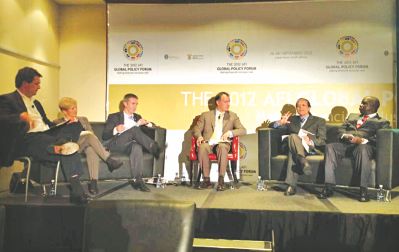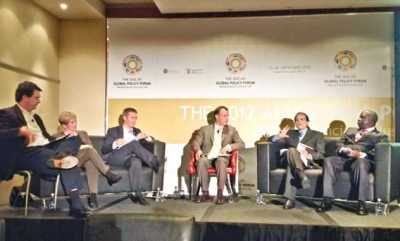Bangladesh Bank
Economic growth to slow to 5.8pc: IMF
 Bangladesh's economic growth may slow down to 5.8 percent in the current fiscal year, largely due to sluggish exports and investment, the International Monetary Fund forecast.
Bangladesh's economic growth may slow down to 5.8 percent in the current fiscal year, largely due to sluggish exports and investment, the International Monetary Fund forecast.
A finance ministry official said an IMF mission made the forecast last month after a two-week review of Bangladesh's latest macro-economic situation.
The government set the GDP growth target for the current fiscal year at 7.2 percent.
In June, Finance Minister AMA Muhith in his budget speech said the trend of satisfactory growth will continue in the commerce and agriculture sectors in 2013 as the global economy is on the rebound.
He also said the productive sectors would get enough credit supply and the deficit in the power and energy sectors would come down.
According to the central bank statistics, like the previous year, slow growth in exports will continue this year. In July, export growth was 4.26 percent and in August it came down to 3.63 percent.
Nasir Uddin Chowdhury, the first vice president of Bangladesh Garment Manufacturers and Exporters Association, earlier told The Daily Star that exports might be slow in September.
The exporters said an economic slowdown in the EU and the US is mainly responsible for a sluggish trend in exports.
According to Bangladesh Bank data, the opening and settlement statistics of letters of credit for import of capital machinery and industrial raw materials also show a slow trend in investment.
Last fiscal year also, LG opening for import of capital machinery fell by 21.22 percent, while LC opening for im-porting industrial raw materials went down by 3.84 percent.
The negative trend continued in the current fiscal year as well. In the first month of the current fiscal year, LC opening for import of capital machinery fell by 30 percent, and for industrial raw materials the decline was 0.63 percent.
However, a BB official said the central bank is now encouraging credit flow to productive sectors under its new monetary policy.
The official said the GDP growth in the current fiscal year will be more than 6 percent.
Though the IMF predicted that the economic growth will be lower than the government's target, the lender said inflation will remain within a single digit.
The IMF mission said inflation will remain close to the government's target of 7.5 percent, according to the BB official. However, the lender is concerned about food inflation as the prices of food commodities are rising on the international market.
The IMF team expressed satisfaction over the central bank's monetary policy, saying it is in the right direction to curb inflation. The IMF encouraged the central bank to continue it, the BB official said.
News: The Daily Star/Bangladesh/2nd-Oct-12
BRAC Bank launches Internet Banking services for corporate clients .
BRAC Bank Monday launched Internet Banking service that can be custom tailored for its corporate clients to enable them to effect wide array of transactions just by a click over Internet that will speed up business operations.
This is the first such service among private local banks in Bangladesh for corporate entities that facilitates payment services through fund transfer, bulk payment including salary disbursement, standing instruction set up within BRAC Bank network. BRAC Bank has plans to expand the service so that companies can send L/C requests. Once Bangladesh Electronic Fund Transfer Network (BEFTN) integration is up this payment services will be expanded for domestic transfers within banking group network.
With BRAC Bank Internet Banking, companies can set up automatic bill payments, initiate future dated transactions apart from getting account statement, transaction history and viewing pending and rejected transactions. In coming days, the companies will also view summary of outstanding L/Cs and Bills with amounts in preferred currency.
BRAC Bank Internet Banking is fully safe and secure as globally used technology of two factor authentication - OTP (One Time Password) is deployed that generates random passwords for each transaction.
Ms Nazneen Sultana, Deputy Governor, Bangladesh Bank, formally launched the service at a program at a city hotel in the city Monday. Mr Syed Mahbubur Rahman, Managing Director & CEO; Mr Mahmoodun Nabi Chowdhury, Head of Corporate Banking; and senior officials of BRAC Bank Limited attended the programme.
Mrs. Nazneen Sultana, Deputy Governor, Bangladesh Bank, lauded BRAC Bank for initiating the IT-enabled service for business entities for smooth and speedy business transactions.
Mr. Syed Mahbubur Rahman, Managing Director & CEO; BRAC Bank, said, "Corporate houses can now bank with us at anytime from any place. They do not need to wait for Sunday morning for cheque encashment to party. They can do it even on weekend's right from a computer at any place. It will definitely bring new dynamism to their business operations and productivity."
"As a tech-savvy bank, BRAC Bank always comes forward with new technology for smart and smooth services to the clients. This pioneering service shows our strong commitment to introduce modern banking services to cater to modern day needs of business entities," he continued.
News: The Daily Financial Express/Bangladesh/30-Sep-12
Financial inclusion is a way out of global crisis: Atiur
 Bangladesh Bank Governor Atiur Rahman, second from right, speaks at the 2012 AFI Global Policy Forum at Cape Town in South Africa on Thursday.
Bangladesh Bank Governor Atiur Rahman, second from right, speaks at the 2012 AFI Global Policy Forum at Cape Town in South Africa on Thursday.
The global economic crisis has brought into attention the need for inclusive growth-focused policies, Bangladesh Bank Governor Atiur Rahman said.
He cited Bangladesh's real GDP, which has been growing at over 6 percent plus amid the global slowdown, as an example.
“The inclusive growth-focused monetary and credit policies have helped the economy maintain a firm foothold on a stable progress path,” Rahman said at the 2012 AFI Global Policy Forum at Cape Town on September 27.
Poverty alleviation, too, has been gaining pace, with a sharp uptrend in rural wages.
“Central banks can play a catalytic role in this reorientation of goals of financial institutions and markets towards the socially responsible inclusive lending practices, by ensuring adequate credit flows to the underserved or financially-excluded economic sectors and population segments.”
Following the global financial crisis the BB launched a countrywide financial inclusion campaign to motivate and guide banks to reach out cost effectively to the underserved rural and urban poor.
Given the fast growing popularity of mobile telephony, mobile financial services (MFS) emerged as a solution, and in 2011 BB issued a guideline on it.
So far 23 banks have been given the licence for MFS, and 14 banks have already started their operations, informed Rahman.
Over the past two years, around 1.3 crore no-frills accounts have been opened in the names of hitherto unbanked people with initial deposits as low as Tk 10, revealed the BB governor.
Bangladesh's daily transaction via mobile banking stands at Tk 33 crore on average, Rahman thinks, provide ample evidence of the ever deepening role of financial inclusion in GDP growth.
News: The Daily Star/Bangladesh/30-Sep-12
Bangladesh Bank Governor Dr. Atiur Rahman seen at a discussion
 Bangladesh Bank Governor Dr. Atiur Rahman seen at a discussion on ‘The Impact of the Financial Crisis on the SME Sector and Potential Policy Responses’ in the Global Policy Forum 2012 in Cape Town Friday.
Bangladesh Bank Governor Dr. Atiur Rahman seen at a discussion on ‘The Impact of the Financial Crisis on the SME Sector and Potential Policy Responses’ in the Global Policy Forum 2012 in Cape Town Friday.
News: The Daily Sun/Bangladesh/29-Sep-12
IMF irked as major conditions for loan remain unfulfilled The lender may defer the second instalment of $1b
The IMF may defer the disbursement of the second instalment of its $1 billion loans for Bangladesh if the government does not fulfil all the related conditions, the lender said.
An IMF mission conveyed this message to the government as some of the major conditions were not met yet.
The team left Dhaka yesterday after reviewing the implementation of the conditions and holding talks with the government for two weeks.
The second instalment or $141 million was supposed to be released by November.
A finance ministry official said the team of the International Monetary Fund expressed dissatisfaction at the amended draft of the VAT law and Banking Company Act.
The lender earlier approved $987 million for Bangladesh to help it overcome macroeconomic pressures and build a buffer reserve.
Bangladesh received one of the seven instalments last year.
According to officials, the IMF mission found major differences in the draft of the VAT law amendment proposal given to them and the one placed in parliament. They expressed serious concern about it.
The proposal was first placed in a cabinet meeting in March for further review.
Later a committee was formed with the Prime Minister's Economic Affairs Adviser Mashiur Rahman as its head to further scrutinise the proposal.
On the basis of the recommendations of this committee, the proposal was again placed in the cabinet in July and it was approved.
Later the draft amendment to the VAT law was placed in parliament, which sent the draft to the parliamentary standing committee on the finance ministry.
The finance ministry official said the original draft to the amendment kept VAT at 15 percent in all stages of value addition but the rate was 5 percent in some cases in the final proposal.
The IMF also objected to another provision, which said the government may give VAT exemption to different sectors for public interest.
In case of the Banking Company Act, the lender wanted the government to cut the authority of the Banking Division and give more power to Bangladesh Bank.
According to the existing banking company law, the BB cannot exert full control over the state-owned banks.
The central bank can only dismiss the higher management and board members of the private commercial banks, but in case of state banks, the BB has no such power.
In such cases, the central bank can only advise the government. But when any irregularity takes place in the public sector banks, the BB has to shoulder the blame.
The IMF recommended amendment to this law to increase the central bank's power.
The IMF told the government that they will not release the loan on time if the VAT law and the banking company act do not get passage in parliament by November incorporating the recommendations, according to the official.
The government will request the lender to waive a condition about the exposure limit of commercial banks in the stockmarket.
Earlier the IMF asked the government to keep such an exposure limit of a bank at 25 percent of its total capital.
But the government wants the exposure limit to be at 40 percent of a bank's total capital. The existing exposure limit of a bank is 10 percent of its deposits.
The official said the IMF did not give any consent to the government's request, but if the overall reform programme remains satisfactory the lender may entertain the request.
Before getting each of the six equal instalments, the government will have to fulfil a set of conditions of the Washington-based lender.
The government by this December has to meet 11 more conditions.
The IMF imposed another condition that the government cannot make hard-term borrowing beyond $1 billion. The government will not need to cross the limit by December. But the government's various requirements next year may need around $3 billion.
The finance ministry official said the government plans to issue $750 million worth of sovereign bonds in the international market.
Besides, the government's guarantee for the private sector power producers will require about $2 billion next year.
The official said the government has requested the IMF to increase the limit of hard-term borrowing for next year. The IMF has hinted that the limit could be raised to $1.5 billion.
News: The Daily Star/Bangladesh/29-Sep-12



